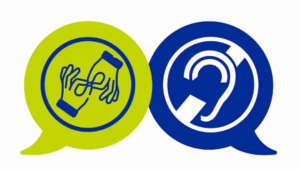Beginning work as an interpreter is a daunting process. There are so many moving parts to consider: training, study, preparation, assignments, and the career itself. And what do you do when you find yourself in an ethical dilemma while on the job? We’ve discussed a variety of preparatory topics in our interpreting blog series. Now, let’s explore some of the most common ethical quandaries and how you should handle them.

Common Ethical Dilemmas
Many interpreting dilemmas fall under the category of “being helpful.” As interpreters, we’re naturally empathetic people and we want to help! However, we need to be mindful of always maintaining the role and boundaries of the interpreter. Interpreting requires a combination of compassion and professional distance. To achieve this balance, avoid:
-
Offering advice or opinions
- It’s important to never offer advice or opinions for any reason, even if you’re qualified to do so. There are going to be times when the non-English speaker or the client attempts to consult with you. When this happens, step out of your role of language conduit and into your role as clarifier. Explain in both languages that you are only there to interpret. You cannot answer questions directed to you, give advice, or give your opinion. Step back into your role of Language Conduit by saying “Thank you. Please continue with the session.
- The party may persist in asking you for your opinion/advice or trying to make side-conversation with you. If this happens, interpret what they’re saying directly. If necessary, clarify again.• Offering personal help outside of the session
- This includes giving rides, gifts (like language-specific magazines and books), and community resource help outside of the session. If the non-English speaker asks, politely say “I’m sorry, but I’m just the interpreter. I’m not allowed to help you out of the session.”
-
- Sometimes, the situation is important for a staff member to know. For example, the patient might not have a ride home from their appointment. In this case, tell the patient’s doctor or another member of the staff. This is the most advocacy you can do. Call your agency to let them know what happened after the appointment.
- Staff members may approve that you’re allowed to bring in the item/food/etc. In this case, proper procedure is to give it to a staff member to give to the patient. This preserves professional distance
-
Accepting Gifts:
This is an especially common ethical situation that comes up. As an interpreter, you’re never allowed to accept gifts, tips, or extra compensation from the parties for whom you interpret. If this comes up, an easy way to go is to blame the agency. “I’m sorry, but as an interpreter I’m not allowed to accept gifts. I could lose my job for accepting it.” It’s an awkward situation, but most people want to make sure you don’t get in trouble.
-
Picking up something they’ve dropped/helping with a fall
- This is particularly relevant in a medical setting–and really tough. If someone falls or drops something, it’s our instinct to help them or pick it up. Unfortunately, we can’t do it. Doctors often use this to assess fall-risk and dexterity. It’s an extremely specific example and one that we’re frequently asked to talk to interpreters about.
It makes sense that you’ll seem trustworthy to the non-English speaker. They’re in a vulnerable position and you’re the only person around who speaks their language. However, as an interpreter, you must keep professional distance. This is for a couple of reasons. Non-English speakers are less likely to make unethical demands of you if you keep some distance. You also help the non-English speaker keep their ability to work with any interpreter, not just you. It’s tough. We want to be nice, and there are elements of being nice in interpreting, but it’s a professional, distant nice. Otherwise, we risk overstepping our bounds and the role of the interpreter.
Conflicts of Interest
Handling conflicts of interest is another case where it’s possible to find yourself in an ethical grey area.
Canon three of the Interpreting Code of Ethics states that interpreters must be impartial and avoid conflicts of interest. But what constitutes a conflict of interest for an interpreter? Here are a couple examples:
-
- You arrive at an assignment and find that the non-English speaker or doctor is someone you know: Usually, there’s a name on your work-order when you receive it. However, sometimes agencies aren’t given that information, or the client says they’ll get back to us and they don’t. Things fall through the cracks. It’s rare, but it happens.
- You arrive at an assignment and find that the client is your personal therapist or doctor: This doesn’t ALWAYS constitute a conflict of interest, but it certainly can–use your best judgment.
- In a legal context: you, your spouse, or your community will be affected by the outcome of the case. This especially applies to financial compensation, such as in a civil suit.
- Also in a legal context: You’ve had a choice in the counsel or law-firm for the case at hand.
- Any other situation where you feel a sense of conflict of interest. Being an interpreter requires a huge amount of honesty and self-assessment. You know yourself and your limits best. Trust your gut.
If you encounter a conflict of interest, act immediately–ask to step away and call your agency. Let them know that there’s a conflict of interest so they can send another interpreter straight away. The agency can also work to reschedule with the client and non-English speaker for another time.
Global Arena’s 16-Hour Training Program
Want to discuss interpreting ethical dilemmas in a dynamic environment of your peers? Sign up for our monthly Interpreter Training Course. It’s 16 hours (spread over four days) of information, practice, and open discussion. At the end of our course, you’ll take a comprehensive exam and receive your training certificate with a passing score. You’ll also create a network of other interpreters to build your professional community.




